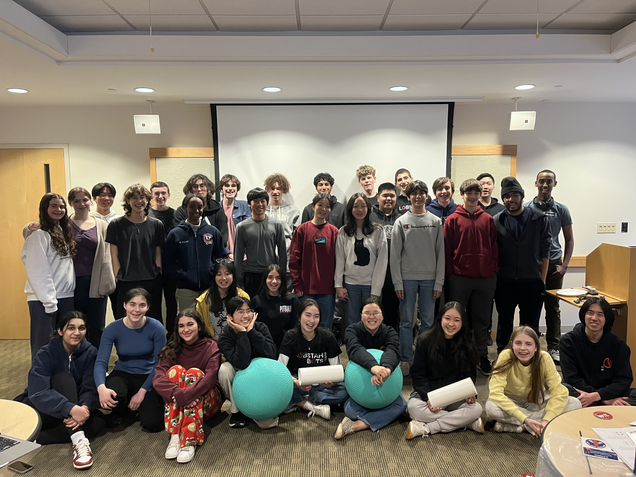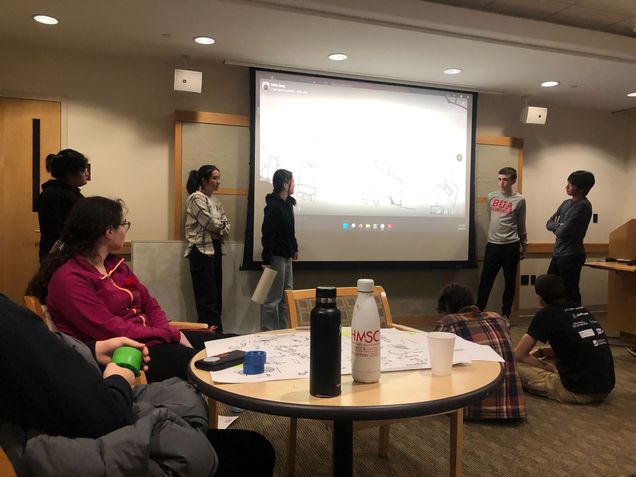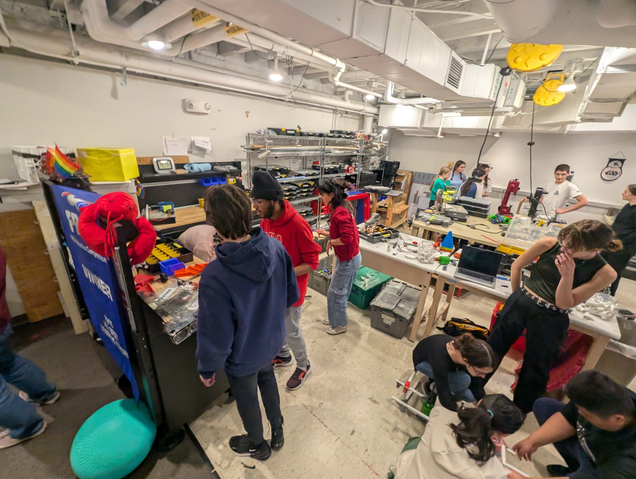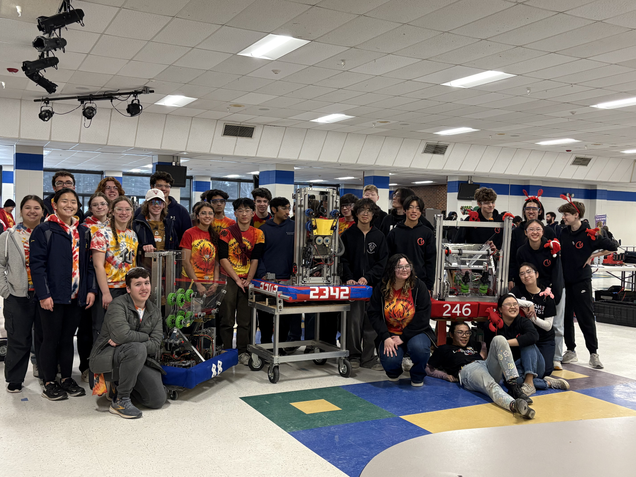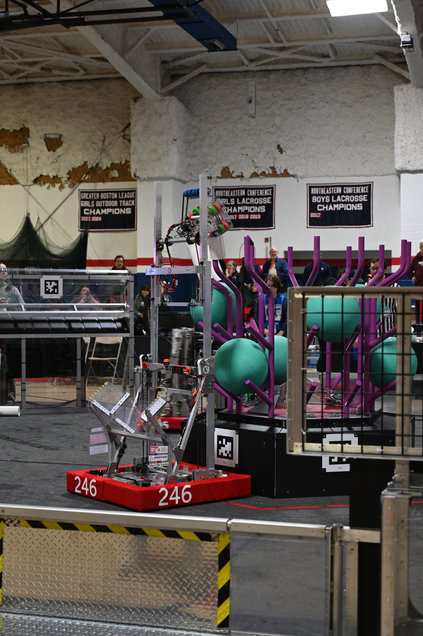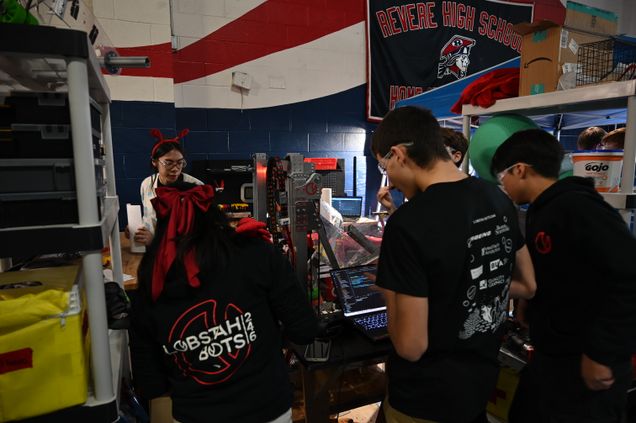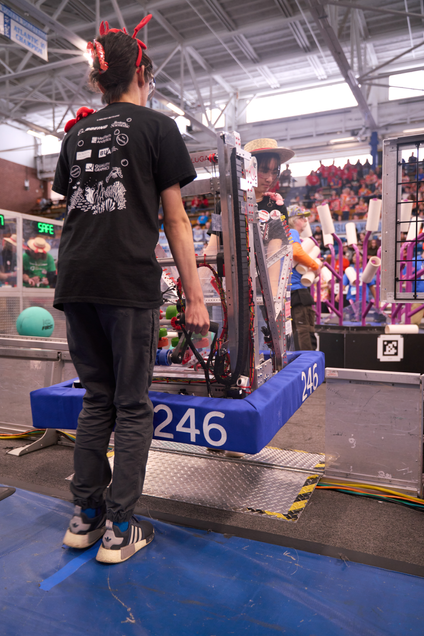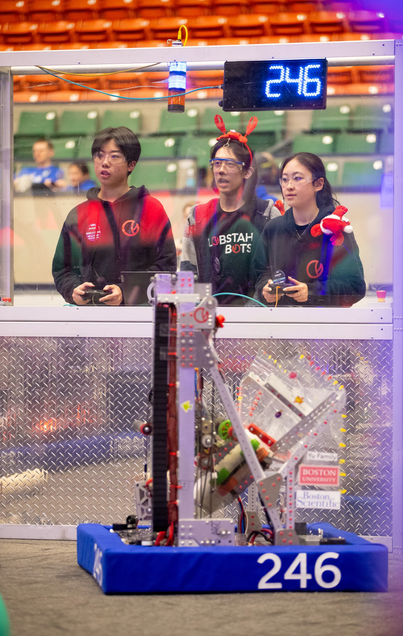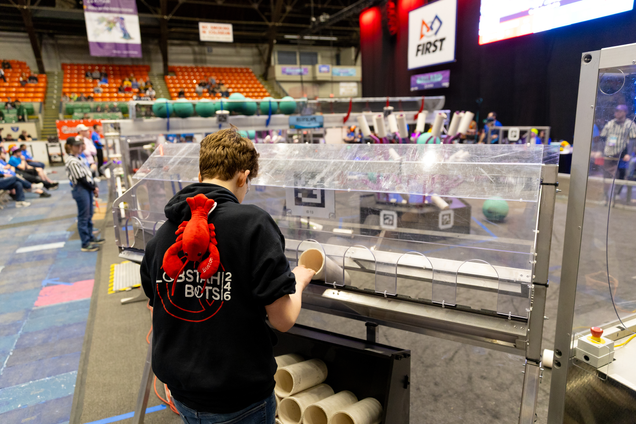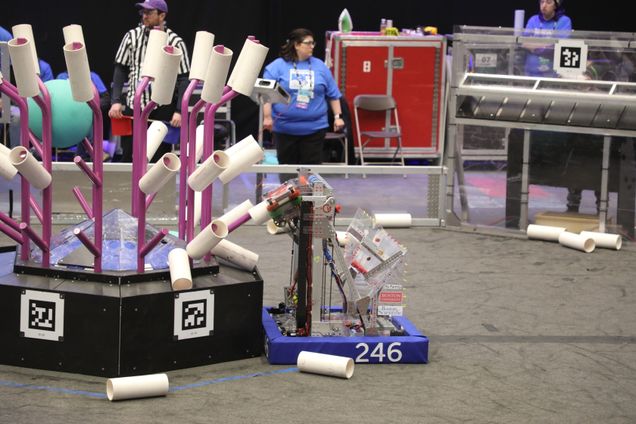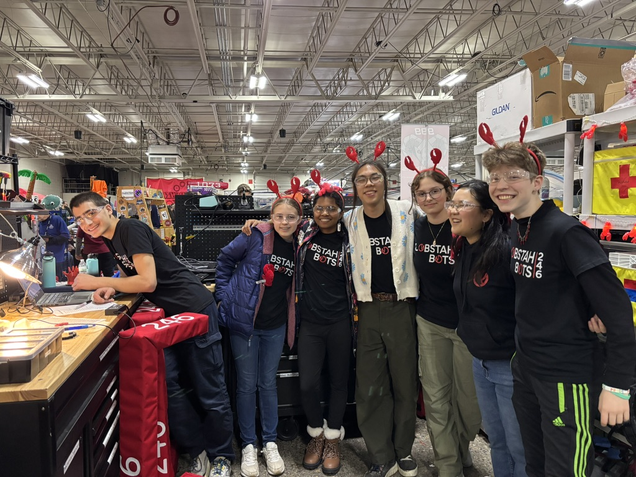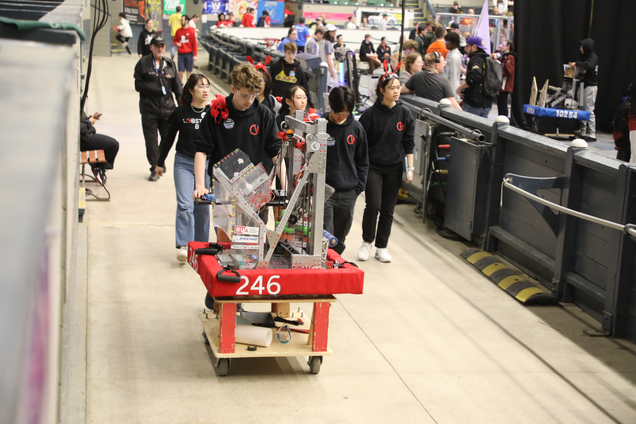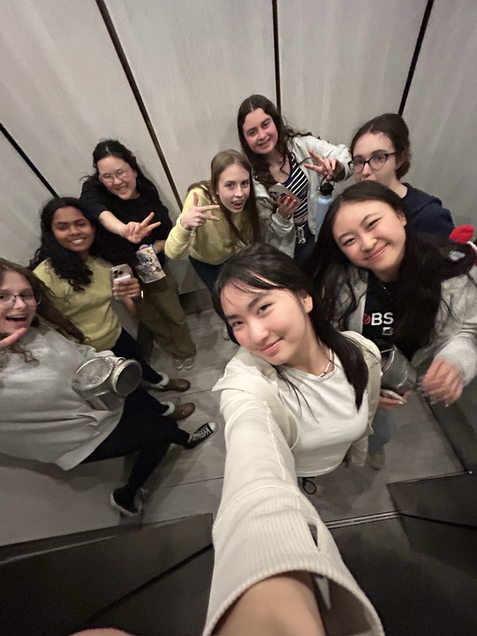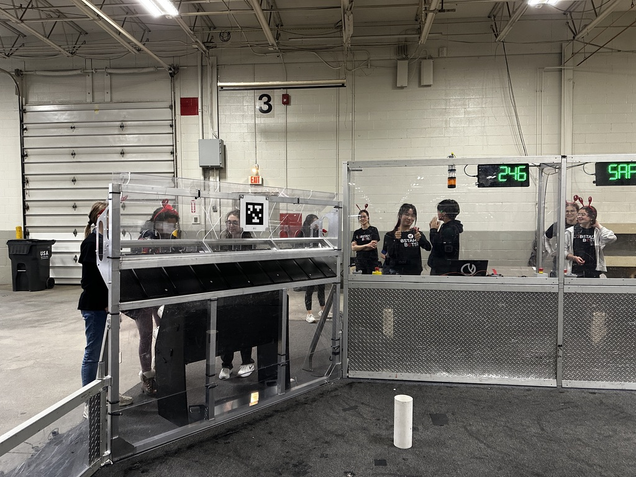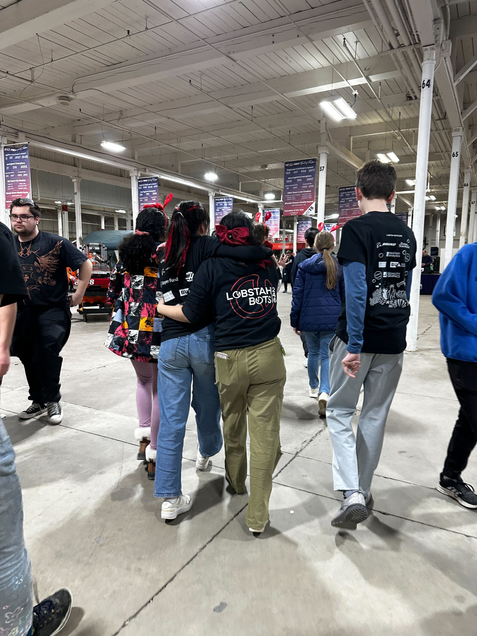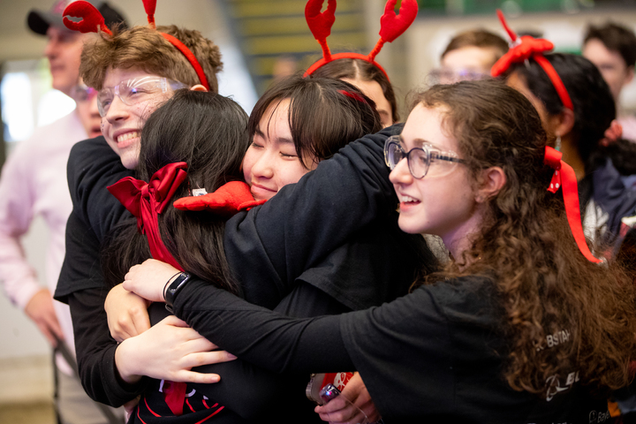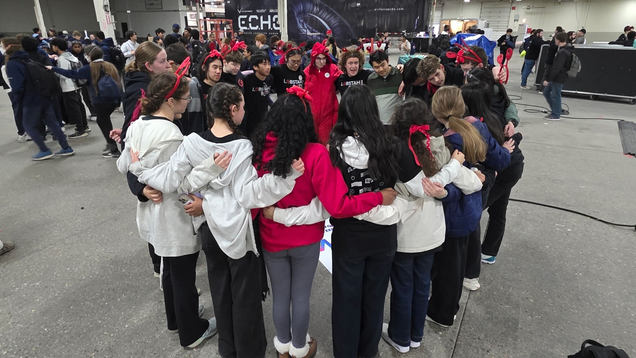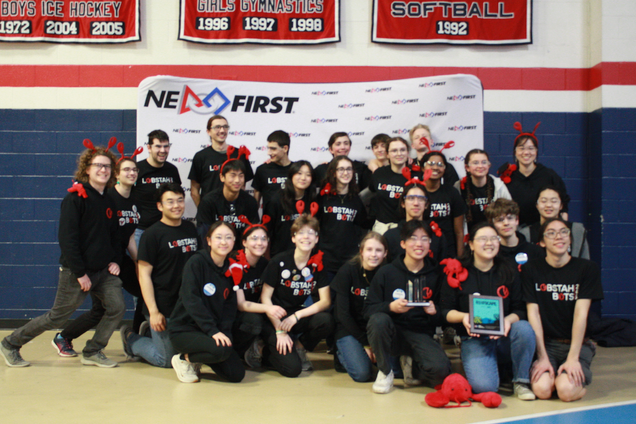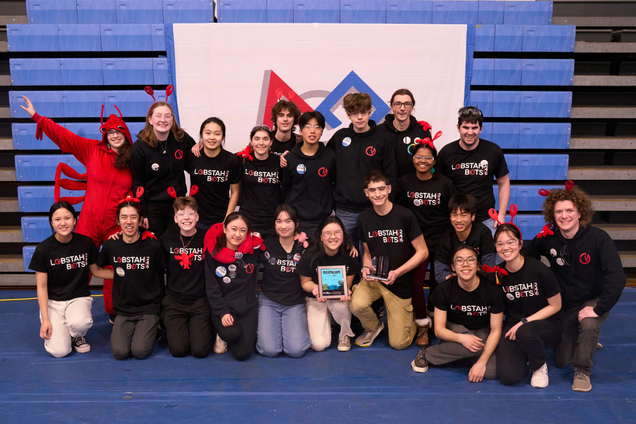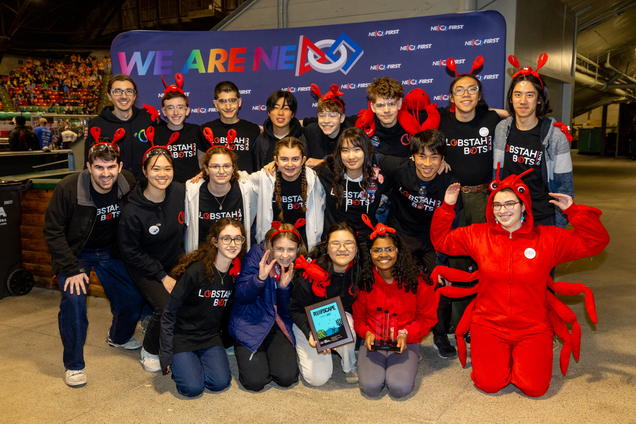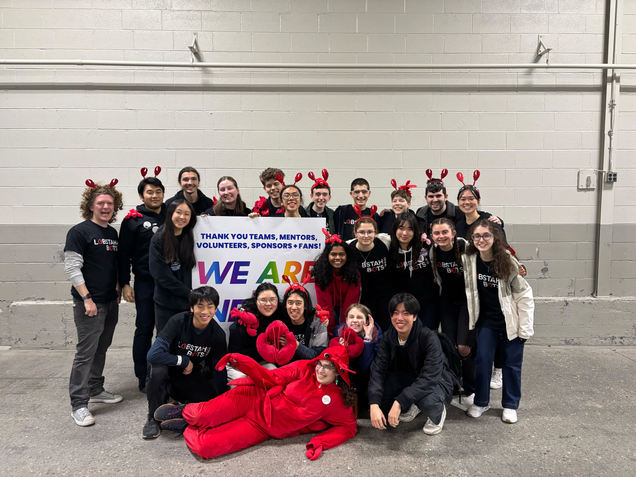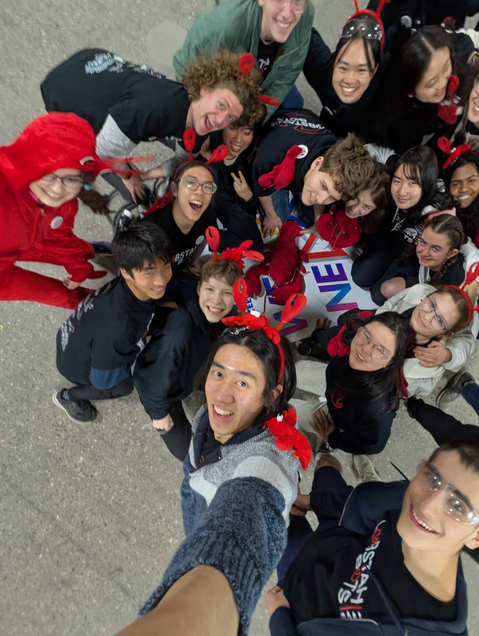News
Senior Thesis Symposium 2025
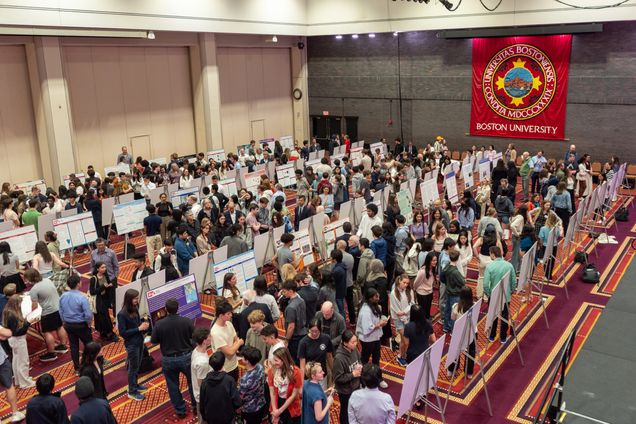 On May 12, BUA's 67 seniors presented their research at our annual Senior Thesis Symposium in BU's Metcalf Hall. Senior theses are the culmination of BUA’s academic program and are undertaken by all seniors in partnership with a BU professor. The Symposium, open to the entire BUA community, celebrates our seniors and gives them platform to share their research with and field questions from a non-expert audience. Each senior prepares a poster featuring the highlights of their thesis research along with an accompanying 'lightning talk,' and then delivers an individual classroom presentation to their peers, teachers, and family members.
On May 12, BUA's 67 seniors presented their research at our annual Senior Thesis Symposium in BU's Metcalf Hall. Senior theses are the culmination of BUA’s academic program and are undertaken by all seniors in partnership with a BU professor. The Symposium, open to the entire BUA community, celebrates our seniors and gives them platform to share their research with and field questions from a non-expert audience. Each senior prepares a poster featuring the highlights of their thesis research along with an accompanying 'lightning talk,' and then delivers an individual classroom presentation to their peers, teachers, and family members.
From bioinformatics to urban planning, the depth and breadth of our seniors' research is astounding. As you can see from the thesis topics below, this is not just an academic exercise: these students have dedicated themselves to research and action with real-world impact in areas they are passionate about, and are poised for lives of purpose in college and beyond.
Class of 2025 Senior Thesis Titles
Addressing Massachusetts’ Housing Crisis: Analyzing Legislative Efforts to Increase Affordable Housing Access
Human in vitro modeling assesses the immune response elicited by vaccine adjuvant formulations in children
Investigating the Impact of Various Opioid Use Disorder Rehabilitation Services on Treatment Completion for Individuals with Mental and Substance Use Disorders
Boston on Film: Exploring the City’s Identity Through Cinema
The New Plantation: Incarceration, Capitalism, and the Oppression of Minorities
Using A Modified Sea Perch Robot for Water Quality Testing in the Charles River
Political Applications of Archaeology under Capitalism and Fascism
A Community-Based Program Model For Engagement of Underserved Students in STEM
Properties of Alpha-Synuclein and Its Effects on Parkinson’s Disease
Piezo2 Activation on the Development of Mouse LTMRs
Long short-term memory neural network to identify surgical targets in human epilepsy
Effects of Ocean Acidification on Humans
AutomataGPT: A Generative Pre-Transformer Model
“Viva a banda-da-da // Long Live the Band”: Tropicália and the Cannibalistic Counterculture of the Global 1960s
A Ban on Billionaires?!
Exploring the Implications of Light-Based Communications Through SeaPerch II
The Prince as an Enigma: Unraveling Machiavelli’s Intentions
Direct Conversion of Centenarian PBMCs as an In Vitro Model of Aging and Resilience: DNA Extraction Protocol Optimization
Roads Not Taken: The Legacy of Boston’s Unbuilt Urban Freeway
Food Science Meets Commercialization: Developing Freeze-Thaw Protocols for Almond Milk and Non-Dairy Coffee Creamer
Polyp Growth Patterns of the Deep Sea Coral Genus Narella Due to Varying Environmental Factors
Perception and Imitation of Linguistic Prosody in Autistic Adults
Relationships between biomass and symbiont density under different food and light treatments in temperate scleractinian coral Astrangia poculata
Perceiving Penelope
Poseidon-Bot: A Streamlined Document Parsing RAG Model
Cages at Risk: The Role of Anterior Column Release in Preventing Cage Dislodgement in Spinal Fusion Surgeries
Reinforcement Learning for CARLA: Using a Custom-Designed CARLA Reinforcement Learning Environment for Self-driving Cars
The Revolutionary Potential of Postmodern Aesthetics: A Historiography and Analysis
Traversing Food Deserts: Solving Food Insecurity with Urban Vertical Farming Systems
Tuberous Sclerosis Complex
Criticisms of the Field Of Impostor Phenomenon Research: Evaluating the Clance Impostor Phenomenon Scale
On Some Aspects of Computer Programming of Business Simulation: An Example of Developing a “National Economy Development” Simulation
How AEK, Panathinaikos, and Olympiakos Reflect Athens’ Social Divisions
Identifying the Optimal Parameters of Neuromodulation in Epilepsy
Modelling of Rhizospheric Escherichiacoli and Pseudomonas simiae using COMETS
TwoStream: A Convolutional Neural Network for Cardiac Imaging Diagnosis
Exploring Cultural Readiness: A Phenomenological Study of the Engagement of Vietnamese Americans in Diabetes Prevention and Self-Management Programs
Trauma & Agency: Understanding Abused Characters Across Texts
A Dilemma in Words: An Analysis of An American Dilemma Reviews from 1944 through 1964
Microeconomic Sustainability of the State Minimum Wage in Massachusetts
Poseidon-Bot: A Streamlined Document Parsing RAG Model
The Impact of All of Us Research Program on Personalized Medicine and Health Disparities
Exploring Cultural Readiness: A Phenomenological Study of the Engagement of Vietnamese Americans in Diabetes Prevention and Self-Management Programs
Through the Eyes of the Breedloves: Slavery, Racism, and Identity in The Bluest Eye
The Responses of Infauna and Epifauna to Nitrogen Loading in Shallow Water Seagrass Beds
Modeling the Growth and Gene Knckouts of Saccharomyces Cerevisiae with COMETS
Against Definition: Identity and Technology in Penda’s Fen
Mapping Dynamics: Invariant Manifolds in Theory and Application
Implications of Climate Change on Future Crop Yields and Potential Solutions
The Effects of the Overexpression of CKAP5 on Facial Morphology and the Development of Craniofacial Disorders
The Power Behind The Model Minority Myth in 2025: Media and Mental Health
How Body Motion Shapes Social Perception
Modeling Long-term Habitability in Known Exoplanets
Factors Affecting Measurements Acquired by Remote Satellites using PLE/PLHR for Orbital Power Line Monitoring
Implementing Classical Architecture in the Design of the City of Atlantis: Drawing Atlantis as Plato Would’ve Imagined
Expanding the Frame: Diversifying the Female Figure in Art Nouveau
1950s Japanese Existentialist Cinema: Origins, Significance, and Meaning
The Comparative Study On Variation in Blood Drip Stains Characteristics due to Change in Paper Varieties
Generating HIV Proviruses to Model Variation of Transcription and Latency Across Different HIV Subtypes
Using Bioinformatics to Look for Treatments for Acute Myeloid Leukemia
Validation of Machine Learning Algorithms for Identifying Sharp-Wave Ripples in Epileptic Conditions
Play with Your Food Before You Eat: Exploring the Effect of Dominance on Play Initiation and Foraging Priority in Red (Varecia variegata rubra) and Black-and-White (Varecia variegata variegata) Ruffed Lemurs (Primates, Lemuridae)
Development of a New Method for Tetherless Underwater Communication Using COTS Parts
Eclipse: The Coexistence of Light and Dark in the Healing Process
Innervation of Axolotl Blastemas
Central Nervous System Recovery Evaluation through Computational With Analysis of Locomotion Kinematics
Epidemiology of Non-Alcoholic Fatty Liver Disease: A Survey from a Community-based Screening Program in South Texas
Daniel Shaer ’26 Wins Arbeiter Holocaust Essay Contest
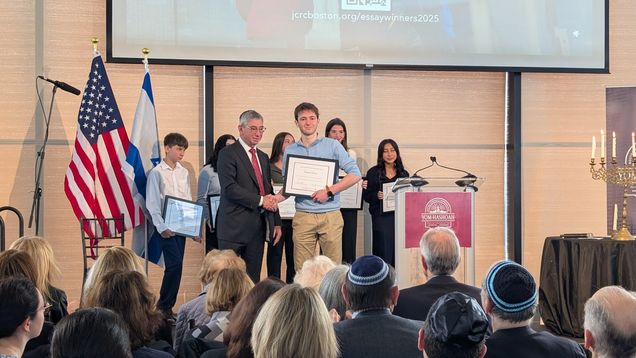 BUA junior Daniel Shaer '26, along with five others, won this year's Israel Arbeiter Holocaust Essay Contest, part of Boston's annual commemoration of Yom HaShoah, the Holocaust Day of Remembrance. Daniel's essay was inspired by a 2023 trip to Erfurt, Germany, to see an exhibit based on his great-grandmother Miriam's diary, which recounts her 1938 exodus from Nazi Germany to British Palestine.
BUA junior Daniel Shaer '26, along with five others, won this year's Israel Arbeiter Holocaust Essay Contest, part of Boston's annual commemoration of Yom HaShoah, the Holocaust Day of Remembrance. Daniel's essay was inspired by a 2023 trip to Erfurt, Germany, to see an exhibit based on his great-grandmother Miriam's diary, which recounts her 1938 exodus from Nazi Germany to British Palestine.
Daniel says, "That trip to Germany in the summer of 2023 to see the exhibit about my great-grandmother's life had such a profound impact on me and I wanted to share what I'd learned in my submission. When I found out that I'd won, I felt so proud to be related to my great-grandmother and incredibly honored that I was able to share her inspiring story."
Daniel, along with the five other essay contest winners, will travel to the United States Holocaust Memorial Museum in Washington DC. In anticipation of this educational experience, Daniel notes: "I’m incredibly grateful for the opportunity to visit the USHMM, and I welcome the chance to reflect more deeply on the story of the Jewish people and my place within it...I believe it's essential to remember the pain and resilience of those who came before us — not just to honor their memory, but to better understand how to face the challenges ahead."
You can read Daniel's winning essay in its entirety below.
Miriam’s Diary: Remembering the Holocaust, Rebuilding the Future
The train slows with a sharp jolt, and I’m lurched from deep in thought. I lean against the window and watch the German countryside speed by. A polite announcement in German signals our arrival at Erfurt Hauptbahnhof, the city where my great-grandmother Miriam grew up. I’m holding a copy of her diary tightly in hand. Her first entry dates to 1935 when she was fourteen—the same age I am now.
We glide into the station and step out onto the chilly platform. I look around at the bustle of morning commuters and imagine Miriam—then called Marion—standing here in 1938, suitcase in hand, knowing she might never return. It jars me that this ordinary place is where my great-grandmother was torn from her home and sent to British Palestine to escape the Nazis.
Just beyond the station walls, I’m stunned to see a large poster: Miriam’s
Tagebuch—Miriam’s Diary—above a photo of her as an adult working in the fields of Kibbutz Degania. Any trace of Marion Feiner, the German girl from the diary, is gone. I reflect on all that was lost in her transformation from Marion to Miriam—and all that rose in its place.
With the Nazi party’s rise in 1933, Marion’s life slowly unraveled. Her father was fired, and she was expelled from her ice-skating rink by the Hitler Youth. Her family knew she couldn’t stay. In 1938 at 17, she left with her Zionist youth group to British Palestine and never saw her parents again. Their last message arrived in March 1941, from Lwow, Poland—just before the Nazi occupation and murder of 120,000 Jews. In her diary’s final entry, she described sitting on the kibbutz water tower contemplating the finality of her parents’ farewell.
I arrive at the museum, surrounded by the quiet hum of local visitors. The exhibit tells
Miriam’s story—from her first diary entry in Erfurt to the family she raised and her life in the new nation of Israel, the country she helped build. At the center of the room, encased in bulletproof glass, is her original diary, donated by my family.
The exhibit is housed in the former headquarters of Topf & Söhne, the engineering firm that designed the crematoria for Auschwitz. Unlike others forced into compliance, Topf & Söhne’s engineers chose to help. They saw themselves as innovators—problem-solvers pushing the boundaries of technology. But their expertise didn’t preserve life; it destroyed it. Their pursuit of “efficiency” made genocide more efficient than ever.
Here I realize the Holocaust wasn’t just enabled by soldiers but by workers—how ordinary people, by failing to consider the impact of their work, became instruments of atrocity.
It’s no coincidence that Miriam’s exhibit is here. The same building that once helped erase the Jewish people now preserves the story of one who survived. But that survival came at a price; Miriam’s life in Israel rose from the loss of the girl she once was. Marion—the German child with a diary, with ice skates, with loving parents—was gone. That tension between what was lost and what came to be lives at the heart of how we must remember the Holocaust today. It reminds us that even with the rise of something new, resilience cannot return things to the way they were.
And so, we must remember: the Holocaust wasn’t just perpetrated with gas chambers or guns. It was perpetrated with silence. With blueprints. With workers who didn’t ask what they worked for. With scientists and engineers who didn’t stop to consider the harm their creations could do.
Today, we are again surrounded by hate. Antisemitism is surging in all corners of the world. Jewish students face harassment, and synagogues are attacked. All the while, technology advances faster than we can understand it. Social media spreads conspiracy theories at lightning speed. Artificial intelligence can replicate hate so well we can’t tell fact from fiction. The tools we build today—algorithms, code, platforms—carry consequences beyond our intent. Once again, those designing the future often fail to ask: What are we really creating, and who might be harmed by it?
Marion’s diary reminds us that history is not inevitable; it is built one decision at a time. The Holocaust wasn’t just the failure of good over evil—it was the failure of imagination: of engineers, workers, and ordinary people who could not, or would not, see where their choices were leading. If we fail to think critically in this era of rapid innovation and boundless possibility, we may realize too late that we’ve built something beyond control. We must speak up, challenge complacency, and act. To remain silent is to give hate permission, to let prejudice shape our future. Marion's words call us not merely to remember, but to choose courage over silence, responsibility over passivity—to build a world in which history can never again unfold unchallenged.
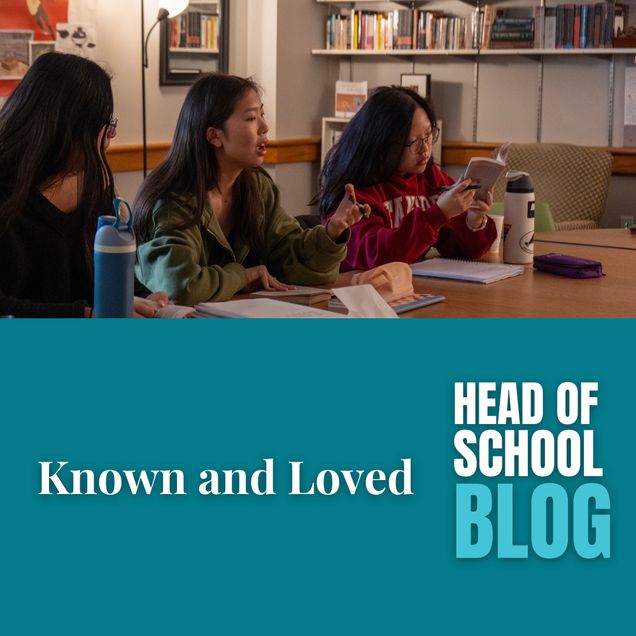
Known and Loved
I’ve visited about a dozen classes this week. I’ll pop in and then follow up in a meeting with the teacher to hear more about what they were working on and offer some observations and kudos. In one humanities class, I noticed that two students who are typically on the quiet side were participating actively in a spirited conversation around the table. I asked the teacher about it. He told me how, earlier in the year, he noticed these two students following along quietly but not entering the fray. He pulled each of the students aside outside of class, sharing that he was impressed with the analysis in their written work and encouraging them to pick a spot or two in each class to share out loud. When they did participate, he made a point to thank them for it. The result was what I saw this week.
There is nothing wrong with being quiet in class; students can be deeply engaged with the ideas without entering the conversation. However, there is real growth that comes from testing your ideas against another’s. It builds analytical flexibility, confidence, empathy, and tact. The teacher knew that. He also knew how to reach these two students and made a point to do so.
I am deeply grateful to work with colleagues who take the time to meet each of these young people where they are – getting to know them as individuals, holding them to appropriately high standards, and offering high levels of support as the students strive to meet those expectations.

MUSE: The Literary Magazine of Boston University Academy
 The Media of Unparalleled Student Expression, or MUSE, is BUA's student-run literary magazine, which seeks to highlight the artistic voice of the student body. Over the course of the academic year, students submit poetry, short fiction, creative nonfiction, and visual art pieces to the club. At weekly meetings, the LitMag team gathers to workshop these submissions, offering both constructive criticism and enthusiastic support. With snacks in hand, students build a space of artistic trust where creative risks are encouraged and feedback is respectful.
The Media of Unparalleled Student Expression, or MUSE, is BUA's student-run literary magazine, which seeks to highlight the artistic voice of the student body. Over the course of the academic year, students submit poetry, short fiction, creative nonfiction, and visual art pieces to the club. At weekly meetings, the LitMag team gathers to workshop these submissions, offering both constructive criticism and enthusiastic support. With snacks in hand, students build a space of artistic trust where creative risks are encouraged and feedback is respectful.
In April and early May, the editorial team curates and compiles final selections from these submissions and includes them in MUSE. The magazine seeks to uplift a wide spectrum of voices and aesthetics. The final product is more than a publication, it is a reflection of the club’s work, shaped by critique, connection, and snacks!
We hope you enjoy the 2025 edition of MUSE!

Lobstah Bots Robotics Season Recap
BUA's robotics team, the Lobstah Bots, netted some impressive accolades this year! Coco M. '26 shares the following season recap.
The Lobstah Bots’ 2025 season has come to an end. After 13 weeks of engineering an entirely new robot, dubbed Beluga, Team 246 has finished its best season since 2016.
Build season started on the first weekend of January, in which the whole team came together to analyze the season and brainstorm robot ideas at Kickoff.
The Lobstah Bots came together to make some big decisions and get a good start on the robot. Following a long iteration and prototyping process, the team worked together to quickly design, fabricate parts for, assemble, wire, and program a functioning robot from scratch in six weeks, to make it to the Week 0 preseason scrimmage event. At the Week 0 scrimmage, we got to get an early look at the game play, get our drivers comfortable with the robot, and identify important areas to improve our robot before our first competition. Completing version 1 of the robot was one of the team’s main goals for the season, and something we were very excited to accomplish. Between Week 0 and the start of our official competition season, our team identified and improved important subsystems of our robot; some that saw major iteration were our end effector and intake.
For our official district-level competitions, we attended two events: the Greater Boston District Event and the University of Rhode Island District Event. Our first competition was the Greater Boston District Event in Revere. We had a wonderful time at the event, and were proud to see many new members picking up roles in pits and stands!
At URI, we seeded eighth out of 37 total teams after qualification matches, and reached the semifinals in playoffs as the first pick of alliance 4. After the team’s performance at our district events, the Lobstah Bots qualified to attend the New England District Championships (DCMP) and compete at the highest level in New England for the third year in a row! At DCMP, we had a lot of fun playing against the top tier of teams all across the district. We also had our most successful DCMP run since 2016, a feat to be truly proud of!
Throughout the season, students gained engineering skills in areas such as design, fabrication, electrical engineering, and programming. In addition, they learned valuable lessons in collaboration and leadership. At all of our events, students explored a wide variety of areas from game strategy to scouting, robot maintenance, and troubleshooting issues in pits. Some team members reflected on their experiences this season:
Emilia M. '28: “This year I learned to manufacture parts for the robot using a variety of machines such as the vertical bandsaw or drill press, along with in the moment fixes in pits at competitions.”
Sabina S. '28: “One of my favorite parts about scouting and strategy is the excitement you get from trying to predict which alliance of robots will win. It’s really reassuring to know that all of the work you did scouting robots for hours makes a huge difference in how our team plays, to the point where it can affect our rankings in the event and how well we do overall.”
Team Captain Kendree C. '25: “I love this team because it always inspires me to see how much passion and excitement everyone has to learn more about robotics, no matter their prior experience level. It’s been amazing to watch this team improve so much in the last four years, and I’m going to miss being part of its wonderful community.”
Our work during build season and at competitions did not go unrecognized, as we won an award at every event we attended: the Excellence in Engineering award at URI, the Gracious Professionalism award at Greater Boston, and the Team Spirit award at District Championships, celebrating our excitement in stands and our dedication to fostering a supportive community. This is our sixth consecutive unique award, continuing our two-year streak, which truly shows our versatility as a team!
The Lobstah Bots’ season has come to a clawsome close. Thank you to the parents, mentors, faculty members, and volunteers who have supported the team at every moment along the way! We're looking forward to making even bigger waves next year! The team poses after winning the Team Spirit Award at District Championships Season Recap 20 Look at our Lobstah spirit at the District Championship!
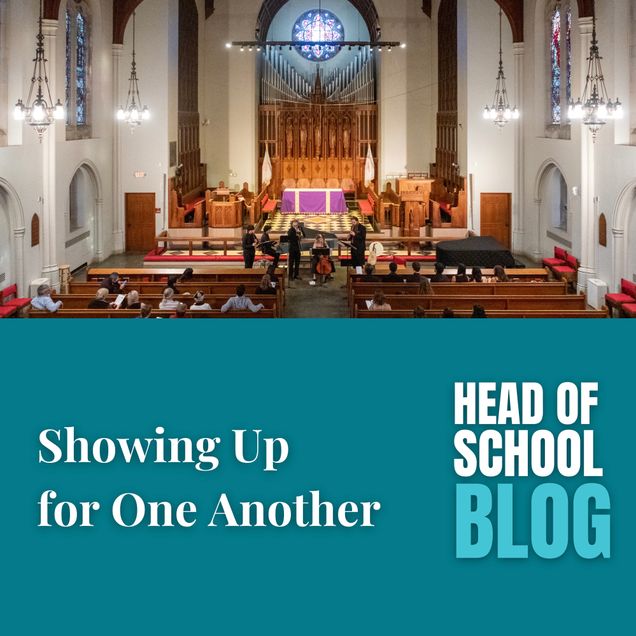
Showing Up for One Another
I had the pleasure of attending BUA’s first-ever early music concert last Wednesday evening. The event was in Marsh Chapel, with its soaring ceilings and stained glass forming a beautiful and fitting setting for the music. We heard from Sonus, BUA’s early music instrumental ensemble, whose performance featured a harpsichord and several other period instruments. We heard from Vox Caeli and Polytropos, BUA’s select choral groups. We heard from a number of soloists and combinations performing pieces mainly from the Renaissance but some stretching as far back as the first century AD. There was so much to celebrate: the virtuosity that was a product of years of hard work; the incredible range of music; the blending of performance and music history; the beautiful partnership between teachers and students.
I want to draw attention to another special thing about that Wednesday night: the audience. Many of the performers’ families were there, but they were not alone. Sitting halfway back in the right seating area, several dozen students had come to support their classmates, on a night when I’m sure they had homework to do and other places they could be. Other students, faculty, and staff were peppered around the chapel. It makes a real difference. I can still remember where my best friend and my chemistry teacher were sitting in the audience when I performed in a musical as a senior in high school. And I know from talking to some of the performers from last week’s concert that they appreciated the support from their friends and teachers.
This is a habit we need to foster. In busy lives, we need to prioritize showing up for one another – at concerts, games, plays, art openings, and club events. It is one way we build community. It is an expression of kindness toward one another. And it’s a lot of fun. See you in the audience.
Meet Sonus, BUA’s Early Music Ensemble
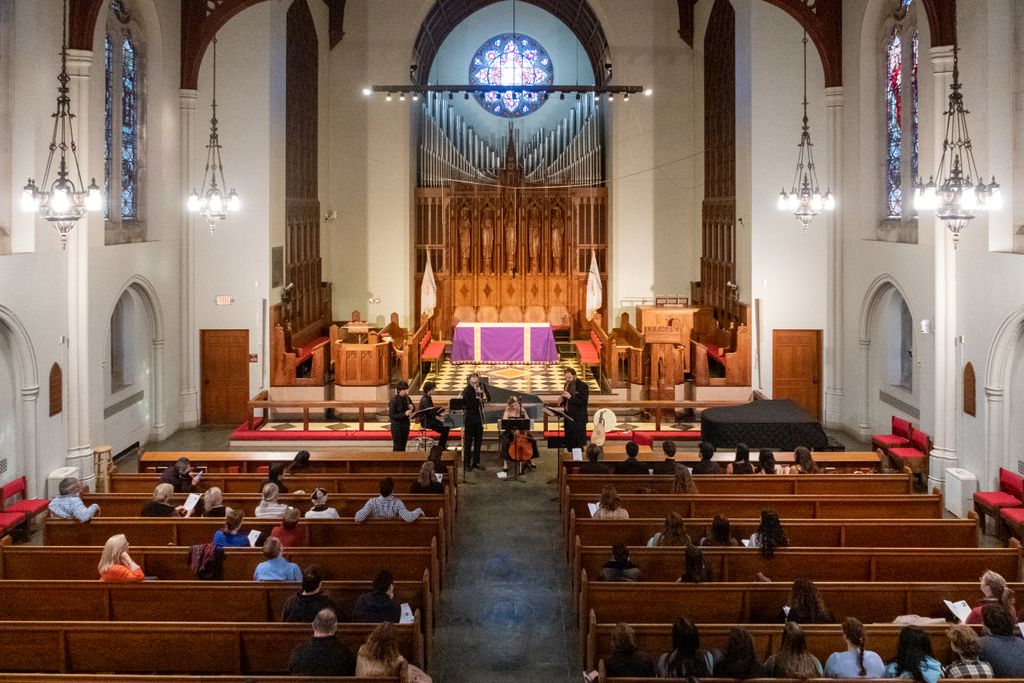 On Wednesday evening, Boston University Academy hosted its first-ever Early Music Concert in the spectacular Marsh Chapel at the heart of BU's campus.
On Wednesday evening, Boston University Academy hosted its first-ever Early Music Concert in the spectacular Marsh Chapel at the heart of BU's campus.
The concert featured our Early Music Ensemble, Sonus, with special guests Vox Caeli, Polytropos, and our very own Dr. Kristin Jewell. The program comprised music from the 1st century AD through the early 1700’s, and was performed on historically accurate instruments such as recorders, cornetto, sackbut, harpsichord, lute, aulos, and more. According to music teacher and concertmaster Dr. Brett Abigaña, Sonus is the only early music ensemble in the country performing on historically accurate instruments.
BUA singers performed madrigals from three different centuries and regions in their original dialects, and Dr. Jewell led a stunning performance of the Seikilos Epitaph, the oldest fully notated piece as yet discovered. We even heard a Colonial American tavern song popular in Boston during the American Revolution! The audience enjoyed a more intimate gathering than our usual large-form concerts in the Tsai Performance Center, and Sonus looks forward to continuing to explore early music in the future, with many more concerts of rarely heard masterpieces on rarely played instruments.
In case you missed it, watch the full recording of the Early Music Concert here.

Halls Filled with Poetry
Lockers and doorways all around BUA this month are covered with poetry. In honor of National Poetry Month, we invite students, teachers, and staff every year to post a beloved poem. As I walked down the hall this morning, I saw work from poets I know – artists like Mary Oliver, Robert Frost, Lewis Carroll, Rudyard Kipling, Percy Shelley, Edgar Allan Poe, Rumi, Pablo Neruda, and Langston Hughes. I came across plenty of works by poets who are new to me, too. Most of the poems are in English, but I’ve also seen pieces in Spanish, Greek, Polish, and Hebrew. There is even some original student poetry shared for all to see. I posted C.P. Cavafy’s Ithaka on my door yesterday morning. Within 30 minutes, I heard two seniors standing outside reading it out loud and discussing the poem.
This is a very special place – a place that can come together to celebrate a love for poetry; where kids want to and feel comfortable sharing their favorites and even their own work, which can be quite personal; and a place where you stop in the hallway to talk about a poem with a friend. I feel very lucky to be here and am committed to preserving this oasis of curiosity and intellectual engagement.
BUA Sets New Record on Giving Day 2025
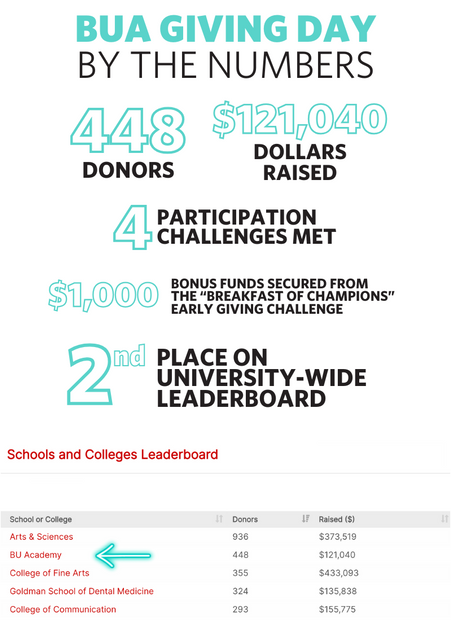 On Giving Day 2025, the BUA community showed up in full force –– and proved what’s possible when we rally around a shared purpose. While we came just shy of our 500-donor goal with 448 total donors, the generosity of our community unlocked our first four challenge levels and raised a record-breaking $121,040 for BUA’s top priorities. Small-but-mighty BUA placed second in number of total donors out of all of BU's schools and colleges, coming in behind only the much larger College of Arts and Sciences (CAS). We also secured an extra $1,000 in bonus funds by winning the “Breakfast of Champions” early giving challenge, logging the most donors between 6:00-9:00 a.m. on Giving Day.
On Giving Day 2025, the BUA community showed up in full force –– and proved what’s possible when we rally around a shared purpose. While we came just shy of our 500-donor goal with 448 total donors, the generosity of our community unlocked our first four challenge levels and raised a record-breaking $121,040 for BUA’s top priorities. Small-but-mighty BUA placed second in number of total donors out of all of BU's schools and colleges, coming in behind only the much larger College of Arts and Sciences (CAS). We also secured an extra $1,000 in bonus funds by winning the “Breakfast of Champions” early giving challenge, logging the most donors between 6:00-9:00 a.m. on Giving Day.
During lunch on Giving Day, BUA students wrote thank-you notes to alumni donors, earning a dumpling for each note they wrote. And Director of Athletics Dave Stone's alter ego, hockey star Mario LeStone, made an appearance on BUA's social channels, encouraging donors to "get off the bench and get in the game" on Giving Day 2025.
The support of our community fuels everything we do. Watch a heartfelt thank you video from BUA Head of School Chris Kolovos here.
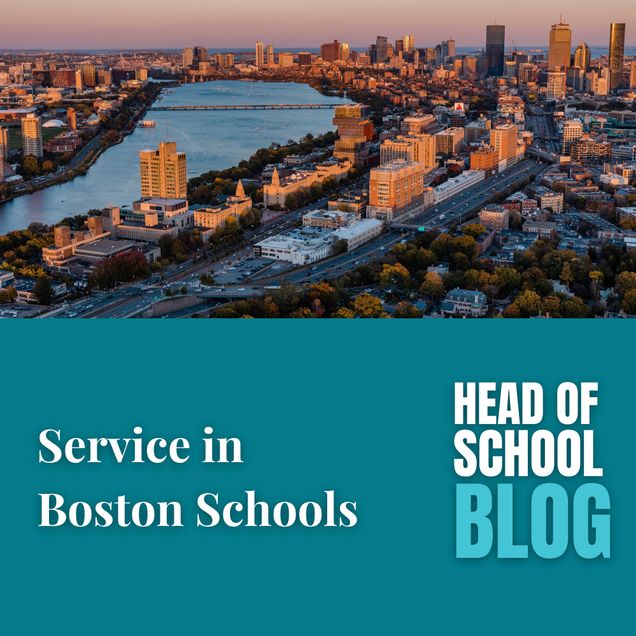
Service in Boston Schools
Earlier this week, I traveled with ten BUA students and a faculty colleague to a local Boston public school as part of BUA’s pilot service initiative. The idea is to have BUA students volunteer at partner schools in Boston – specifically helping out in the after-school programs with younger students and with anything else those partner schools need. The BUA students fanned out across the school. Some played spirited games of Uno with 3rd and 4th graders; I’m told our younger friends mostly won! Others assisted with math and language-arts worksheets for elementary students and middle schoolers. Some built Lego houses on the gym floor with second graders. Some worked through and organized donated products and other classroom supplies to assist teachers. I got involved too with some math homework help exploring halves and wholes – I couldn’t help myself! That same group of BUA students will travel back to the school weekly through the spring. It was a pleasure to watch our students engage, smile, and shine.
We are two weeks into this pilot, expertly organized by Ms. Kamen, and so far it has been a real success. Our students are having a good experience, and from my observation, the students and teachers at our partner school are benefiting too. With very little advertising, we filled up the slots for this program almost immediately, unfortunately having to turn some BUA students away. Even Boston traffic seems to be cooperating. Based on that early data, we are looking to expand the program next year to more BUA students, more weeks in the year, and perhaps to more partner schools.
And I’m glad. I’ve felt for years that our school could be more connected with the City of Boston and that there are more mutually beneficial relationships waiting to be made. This is one way we are pursuing the goal in BUA’s Vision 2030 to more fully leverage and engage with the City of Boston. It is also another way we are fulfilling our mission’s promise for BUA to be a place where “kind and curious students . . . engage meaningfully in our community and beyond.” A structured program like this connecting BUA with local school partners will only enhance the existing culture of service. So far so good!
